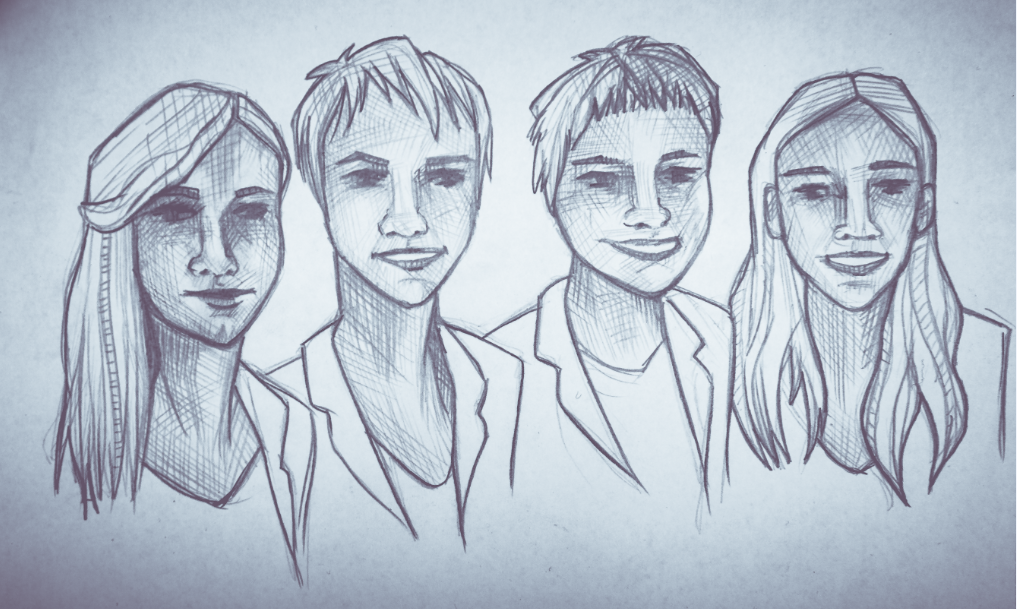
Childhood
People often want to know what my childhood was like, but mostly they want to know what was wrong with it. The kind of light homophobia that comes from assumptions that you weren’t parented properly: did you have the right kind role models? Were you bullied? At the end of the day, it all comes down to asking you if you regret that your parents are your parents. This is and always has been hurtful to me because it’s deeply homophobic, but also because it’s deeply offensive to every day I’ve lived with my parents. My parents are wonderful people I won’t hear a word against. Or I wouldn’t if I had the option to choose. Too bad stories on queer families need that sense of ‘balance’.
I only realised we were “non-traditional” when other kids in schools started asking questions.
My childhood was charmed. I wouldn’t trade my parents for any smiling hetero two-kids-one-dog couple in the Iona ads. And that’s not just a political statement; my mum worked hard to make me feel that way. She scared the wits out of bullies. She stopped me from having nightmares. She made me eat healthy food I hated; food I love now, because she made me eat it enough times. Having two mums was normal to me growing up; they never made it feel strange. I only realised we were “non-traditional” when other kids in schools started asking questions. I was never bullied for it, but people asked pressing questions; everyone wanted to know if I was gay too. People’s assumptions and probing made me struggle with my own sexuality, even though my parents have been easy to talk to about it.
Lack of recognition
I never had doubts about my family’s legitimacy; I don’t need the state to tell me that my parents are my parents. But the lack of recognition causes problems. It’s frustrating to listen to people on TV saying your family is ‘not ideal’. It’s insulting to have to answer probing questions all the time. Most of all, though, I missed out on legal protection. When I was five years old, my mum’s first female partner was diagnosed with terminal breast cancer. She was given six months; she lived three years. It was the most surreal time of my life. Taking multiple holidays a year, getting a dog, re-doing the house, all laced with impending doom. I considered this woman a parent, and I started thinking about what would happen if my other mum died. When Mum 2 came into our lives, I felt more secure. But I realised at some point that she had no legal claim to me. If something happened to Mum 1, where could we go? Not one but both of our parents would be taken away. Not many 10-year-olds have to worry about things like that.
Legislation
The Children and Family Relationships Bill will help take children out of this legal limbo, but the state should acknowledge that we aren’t talking about the right couples might someday have to raise children; they already are raising children and those children have been failed. I’m an adult now, no longer worried about my own situation. Now I worry about the kids who are still vulnerable. I’ve heard of at least one case of a child being told by their Catholic school that they shouldn’t discuss their parents with the other children. Luckily, my school was an Educate Together.
Marriage isn’t personally important to me. I’ve never wanted kids and the idea of tying myself to someone doesn’t sit right; I’d rather be just my own person. I also think families who aren’t tied together by marriage should be offered protection. If parents don’t want to get married, we shouldn’t disadvantage them or their children. But as long as the institution exists, as long as it comes with privileges, it needs to be equal. And for me, it’s also about having watched my parents campaign for years for this. Even without the problems for me growing up, my parents want their marriage recognised; that’s a good enough reason for me to campaign.
There are no characteristics that are unique to mothers or fathers, unless you believe in gendered stereotypes of Daddy breadwinners and Mammy bakers.
The Children and Family Relationships Bill will solve most of the practical problems. But children won’t be taken out of the conversation about marriage equality, because the No side want us there. They want to paint us not as evil or incapable, just as “not ideal’”. Apparently. The easiest way for the No side to win will be to wax lyrical about the child’s ‘right to a mother and a father’, as if those concepts mean anything specific. Every parent is different. There are no characteristics that are unique to mothers or fathers, unless you believe in gendered stereotypes of Daddy breadwinners and Mammy bakers.
Children will be part of the conversation because we all have the image of the nuclear family branded into our minds after generations of heteronormative media. That’s the easiest way for the No side to look plausible. That means you have to counteract it with something; we have the statistics and reports, but what works much better is real people’s stories. Canvassing for marriage equality has always been more successful when queer people go door to door and tell the story of how happy they and their partner are. For children, this debate means opening up your childhood memories and showing them off. That isn’t fun, but if it means showing Iona that they can’t use me to hurt my family, it’s necessary.
Illustration: Nadia Bertaud






